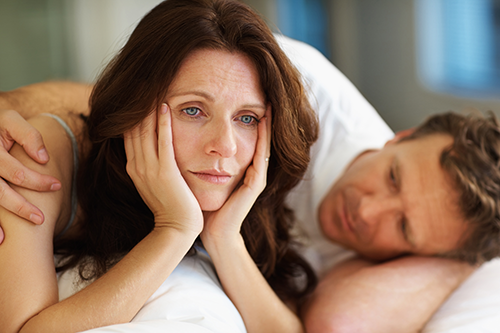 Night sweats, or nocturnal hyperhidrosis, literally means excessive sweating at night. People who suffer from this condition typically wake up at night to find their clothes and bedding drenched in their own sweat, even if the room temperature is cool. Although it can be annoying, night sweats are usually harmless. Nevertheless, it can also be a symptom of an underlying disease or medical condition, and one should consult their doctor if it continues to bother them.
Night sweats, or nocturnal hyperhidrosis, literally means excessive sweating at night. People who suffer from this condition typically wake up at night to find their clothes and bedding drenched in their own sweat, even if the room temperature is cool. Although it can be annoying, night sweats are usually harmless. Nevertheless, it can also be a symptom of an underlying disease or medical condition, and one should consult their doctor if it continues to bother them.
What Are the Symptoms of Night Sweats?
Night sweats involves nighttime sweating, which leads to soaking one's clothes and/or bedding, and is related to an underlying medical cause. However, these episodes are not due to the warm temperature of the room or the use of warm blankets or clothes, which must be distinguished from true night sweats.
Symptoms Associated with Night Sweats
Depending on the underlying disorder that may be causing night sweats, other symptoms may accompany the condition and may affect sleep as well as the body.
Common Symptoms Along with Night Sweats
Night sweats may be accompanied by other common symptoms such as:
- Anxiety
- Fatigue
- Cough
- Fever, chills
- Malaise, lethargy
- Loss of appetite
- Rapid heart rate
- Shortness of breath
- Unexplained weight loss
Severe Symptoms Along with Night Sweats
Night sweats that suggest the presence of a serious condition is often associated with other symptoms, for which you must seek immediate treatment:
- Coughing up blood
- Rapid breathing
- Difficulty breathing
- Disorientation
- Fever, chills
- Stiff neck
- Severe headache
- Unexplained weight loss
When to See a Doctor
It is always best to see a doctor for prompt evaluation and treatment when you experience night sweats and other symptoms, because these could be related to a serious condition.
What Can Cause Night Sweats?
Menopause
Hot flashes related to menopause can cause women to sweat at night. This very common symptom affects women who are around 50 years old.
Side Effects of Medication
Certain medications can cause night sweats. These include antidepressant medications and other psychiatric drugs. Medicines used to lower fever, such as acetaminophen and aspirin, and several other drugs can also cause flushing and night sweating.
Infection
Tuberculosis, HIV infection, and bacterial infections of the heart valves (endocarditis), of the bones (osteomyelitis), and in the skin (abscesses) can likewise cause night sweats.
Diseases
- Cancer. Night sweats may be an early symptom of cancer, particularly lymphoma. People who have cancer usually suffer from other symptoms, such as unexplained fever and weight loss.
- Hormonal disorder. Sweating at night and flushing may also be seen with various hormone disorders, such as pheochromocytoma, hyperthyroidism, and carcinoid syndrome.
- Neurological disorder. Neurologic conditions, though less common, can cause night sweats. These include autonomic dysreflexia, stroke, posttraumatic syringomyelia, and autonomic neuropathy.
What Are the Treatments for Night Sweats?
Medical Treatments
The treatment for night sweating depends on the underlying condition that is causing it, such as hormone therapy for menopause. Treatments are often not directed at your sweating problem, but towards the underlying disease or condition, which can result in relief of night sweats. If your condition is related to your intake of certain medications, discontinuing or shifting to other medicines may stop your night sweats.
Advice for Relieving Night Sweats
- Keep the bedroom cool. Turning up the air conditioner or using an electric fan to cool the room may help reduce night sweats. If someone in the family does not like chilly air from an air conditioner, use a fan near your bed to circulate air and cool down the surrounding temperature.
- Switch your pajamas. The best way to fight against night sweats is to wear light pajamas made of cotton or other natural fabrics instead of flannel or polyester. Choose loose-fitting nightwear rather than pajamas with long sleeves.
- Change your sheets. Choose bed sheets with a low thread count, preferably 300 or less. Avoid sheets with higher thread counts because they trap heat and moisture. Avoid using down comforters and just use plain sheets.
- Avoid drinking or eating spicy food. Instead of drinking alcohol, take iced tea or cold water before bedtime. Alcohol can make hot flashes or night sweats worse. It is also best to avoid spicy foods before bedtime, because these can increase your body temperature and make night sweats worse.
- Reduce stress by taking a breath. Deep breathing helps reduce stress, and decrease the intensity and frequency of hot flashes. Take deep breaths before going to bed. Do this also when you wake up sweating in the middle of the night, because it can help put you back to sleep.
The video below may help you relieve night sweats by yoga:
